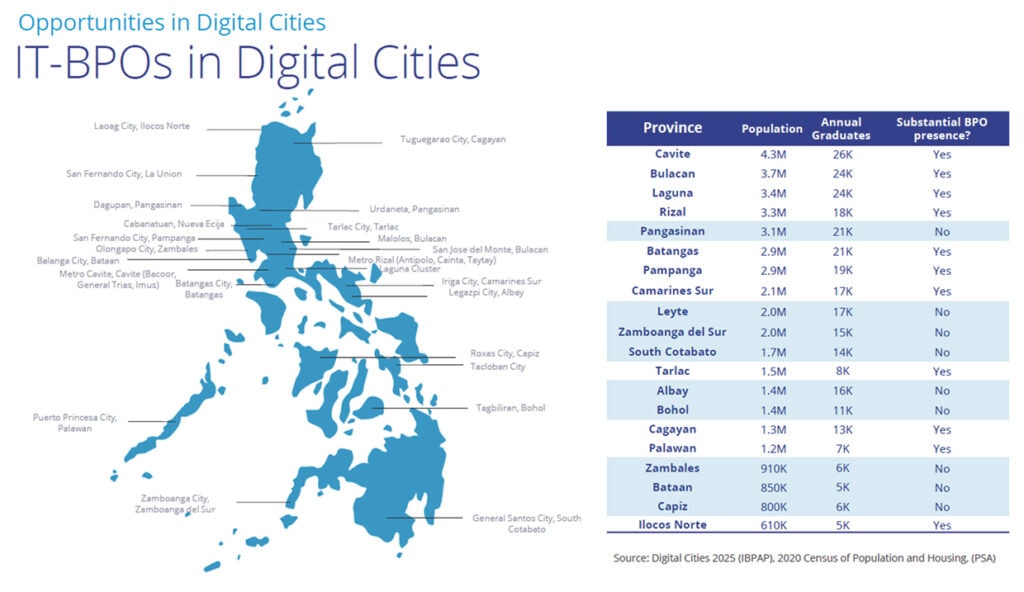The recent pronouncement of the Fiscal Incentives Review Board (FIRB) to allow 100 percent work from home arrangement (WFH) for Information Technology and Business Process Management (IT-BPM) companies will allow the firms to attract and keep talent within local industry and increase the competitiveness of the Philippines in terms of foreign investments.
Employees living outside the BPO centers in Metro Manila will now be allowed to remain in their respective hometowns in the provinces and in turn, contribute to the growth of the local economy and countryside development. Conventional thinking may suggest that working from home will reduce the need for office space. This might be true to an extent in Metro Manila’s established business districts with high office concentrations, but WFH arrangements might actually spur office developments in the countryside.
Traffic and the commute have proven to be major decision points for both employees and employers alike. With WFH, opportunities for employment become more wide-reaching which grants locator companies access to a larger talent pool.As people move back or stay in the provinces, BPOs will want to establish physical presence in major provincial locations to serve as recruitment and training centers as well as disaster recovery facilities for business continuity. These “micro-sites” may not be as big as the office requirements in the past when BPOs enter a new provincial market for the first time but can be smaller than 1,000 sqm.

Locating physical “micro-sites” close to employees’ homes with a hybrid of WFH, may boost employment opportunities and expand the amount of talent companies can explore which may consequently drive provincial investments such as office space. One example is an outsourcing company which has sites in Tarlac, Cebu, Manila, Clark and an upcoming one in Pampanga to be closer to where their employees live. This has been part of their decision-making process from the start as their focus is the experience of their employees.
Previously, only tier-one BPOs had the capability to enter the provinces but with WFH reducing the capital and real estate needed to enter a provincial market, Colliers sees more BPOs setting up micro-sites in the provinces. A provincial location which used to house two or three big BPOs with a total office real estate of 6,000 sqm can now host 10 additional smaller BPOs of 8,000 to 10,000 sqm of collective office real estate needs.
This strategy is further benefitted by FIRB allowing BPO companies accredited with PEZA to transfer their incentives under the Board of Investments (BOI). This matters in real estate selection because PEZA-accredited companies are required to lease in PEZA-accredited office space, whereas BOI registered firms do not have that limitation. This will allow firms that transfer their investment status from PEZA to BOI to have a wider selection of office real estate in any given location. This may even give private developers the confidence to build and market their spaces without waiting for the coveted Presidential Proclamation from Malacañang needed for a PEZA accreditation.
Colliers View
Colliers believes that the stage has been set for more IT-BPM provincial investment and expansion. The government has been planning for countryside development since the previous administration.
Unfortunately, there was that considerable speed bump that was called the COVID-19 pandemic and all that WFH debate since last year. However, it is now time to maximize the current operating environment and the government’s latest position on WFH. Colliers encourages BPOs to revisit previously shelved provincial plans and to combine those with planned hybrid work policies. Also, private investors and real estate developers are encouraged to make strategic first moves in untapped provincial markets. They can even consider conversions of existing real estate assets to quickly accommodate BPO requirements. Lastly, local government units are recommended to actively engage BPO interest in their provinces by tailor fitting appropriate incentives and support. Increasing police presence, re-routing public transportation, and creating partnerships with local state colleges will certainly go a long way in cultivating BPO investment.
It’s time to realize the dream of long-lasting countryside development. WFH may be the first step toward that reality.
